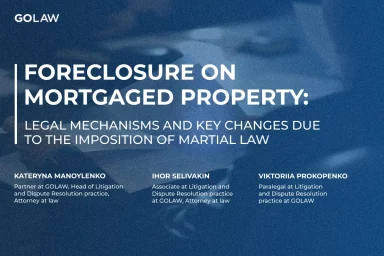The future of сryptocurrencies in Ukraine: what virtual asset holders should prepare for?
Contents
The law also classifies virtual assets into three categories:
- unbacked tokens (e.g., Bitcoin, which does not confer property rights);
- backed tokens (secured by specific property or rights, e.g., NFTs);
- financial tokens (backed by securities or hryvnia — these are security tokens and stablecoins).
However, despite the adoption of the law, it has not yet entered into force due to the absence of necessary accompanying amendments to the Tax Code. Due to this situation, Ukraine’s crypto market continues to operate mainly abroad, as there is no precise legal regulation of this sphere in Ukraine.
Citizens and Ukrainian businesses lack clear rules regarding lawful activities, profit registration, or tax payments on virtual asset transactions.
Ukrainian banks, fearing uncertainty and possible sanctions from the National Bank of Ukraine, block any cryptocurrency transactions.
A new stage of virtual asset regulation in Ukraine
Draft Law No. 10225-d, registered on 24 April 2025 by People’s Deputy Danylo Hetmantsev, has the potential to become a key document in the sphere of cryptocurrency market regulation. The document provides for amendments to the Tax Code of Ukraine, the advertising law, and several other legislative acts concerning the circulation of virtual assets.
The draft law has already been recommended by the relevant Committee of the Verkhovna Rada for first reading. In particular, the draft law proposes to present the applicable law in a new version, which will be titled “On Virtual Asset Markets”.
It is proposed to define a virtual asset as a type of digital thing that is created, transmitted, and stored in electronic form using distributed ledger technology or other similar technology.
The draft law details the classification of virtual assets, clarifies tax rules, introduces advertising requirements, and strengthens the licensing of service providers. In particular, it is proposed to divide virtual assets by analogy with the European MiCA regulation into:
- asset-backed tokens;
- electronic money tokens; and
- other virtual assets.
Ownership rights to virtual assets may be acquired upon the fact of virtual asset issuance, execution of a legal transaction regarding a virtual asset, based on law or court decision, and is confirmed by the fact of possessing keys, and in case of issuance and circulation should be recorded in a “white paper” with a complete description of the asset, issuer, and risks.
The draft law also provides precise requirements for the activities of platforms that trade virtual assets. Such platforms should obtain formal permission from the relevant regulator and ensure an appropriate level of transparency and information disclosure, including identification of trading participants, description of trading mechanisms, and systems for preventing market manipulation.
Taxation of transactions with virtual assets
Individuals will pay tax on the difference between income from sales and expenses for purchasing digital assets during the year and will independently declare and pay personal income tax.
At the same time, several exceptions are defined that will not be subject to taxation. In particular, operations for exchanging one virtual asset for another, sale of virtual assets within one minimum wage per year, as well as assets that were obtained as a result of issuance (including as a result of mining) on a gratuitous basis from the issuer, or in exchange for personal data will not be taxed.
For assets acquired before the law takes effect, a preferential personal income tax rate of 5% applies for 2026. Starting from the next period, the standard rate of 18% will apply, taking into account the additional military tax.
Regarding corporate income tax, the draft law provides for the introduction of new tax differences for adjusting the financial result before taxation. This approach is implemented by analogy with the procedure for taxing securities transactions. It is expected that the list of expenses that may be taken into account when conducting virtual asset transactions will be approved by the Ministry of Finance of Ukraine based on submissions from the financial market regulator. Virtual asset transactions will be prohibited for single taxpayers. Service providers involved in the circulation of such assets will not be eligible to use the simplified taxation system.
Licensing of service providers in the field of virtual assets
Licensing of virtual asset service providers (including exchanges, exchangers, and wallet providers) will also change, providing for strict regulatory requirements and an increased level of state control.
The draft law proposes establishing precise requirements for the organisational and legal forms of entities conducting activities in the sphere of virtual asset circulation on the territory of Ukraine. Such companies should be registered in Ukraine as joint-stock companies, limited liability companies, or additional liability companies. Mandatory conditions include being located on the territory of Ukraine, having at least one director-resident, and ensuring the actual management of the company’s activities from within the territory of Ukraine.
Crypto exchanges registered abroad will be able to operate on Ukrainian territory only if they pass a simplified authorisation procedure in Ukraine and are established in the EU (or in other countries permitted by the regulator).
Overall, the ideology of the draft law is consistent with the approaches outlined in EU Regulation MiCA (Markets in Crypto-Assets), adopted in the spring of 2023. Ukrainian officials openly direct themselves toward MiCA, taking into account the European classification of tokens and requirements for “white papers” and AML/KYC. For example, under MiCA, any stablecoins issued in the EU should be backed by assets in a European jurisdiction – this is also what the NBU strives for.
Given Ukraine’s obligations within the framework of European integration, the implementation of MiCA principles in national legislation is not only expected but also necessary. Taking into account the provisions of this Regulation is a mandatory condition for the gradual harmonisation of the Ukrainian virtual asset market with European Union law.
The impact of cryptocurrency reforms, including the mentioned draft law, on business is twofold. On the one hand, the legalisation of activities and the introduction of clear rules will ensure transparency and the possibility of officially working in Ukraine. The absence of taxation on simple token holding or their circulation without conversion to fiat will, on the contrary, stimulate declared work in this sphere.
On the other hand, regulatory pressure is expected to increase. Businesses will have to bear additional costs, including implementing KYC/AML procedures, maintaining transaction records, submitting reports, and paying taxes.
At the same time, the political context should also be considered. Several media outlets have reported that the Office of the President might block the draft law’s advancement. Among the reasons cited are concerns about the premature redistribution of regulatory powers, particularly between the Ministry of Digital Transformation and the National Securities and Stock Market Commission. Such uncertainty may complicate the implementation of the reform despite its strategic importance for the financial sector and Ukraine’s international obligations.
Conclusion
As a result, the planned cryptocurrency reforms will bring both legal certainty and new obligations to market participants. Given the new tax rules and licensing requirements, companies should prepare in advance by creating internal policies, consulting with the regulator, and monitoring the final text of the law. Such a systematic approach will help minimise the risks of fines or operational losses and allow companies to benefit from the new rules.

Oleksandr Melnyk
Partner, Head of Corporate Law and M&A practice, Attorney at law
- Contacts
- 31/33 Kniaziv Ostrozkykh St, Zorianyi Business Center, Kyiv, Ukraine, 01010
- o.melnyk@golaw.ua
- +38 044 581 1220
- Recognitions
- The Legal 500 2024
- IFLR1000 2024 (International Financial Law Review)
- Legal 500 Green Guide 2024
- TOP-50 Law Firms of Ukraine Ranking | YURPRAKTYKA
Get in touch
To get a consultation, please fill out the form below or call us right away:Sign up to be aware
New achievements are inspired by information. GO further, don’t miss out GOLAW news and legal alerts
Our expertise
-
- Energy and Natural Resources
- Antitrust and Competition
- Banking and Finance
- Compliance, Corporate Governance and Risk Management
- Corporate and M&A
- Criminal and White Collar Defence
- Defense in Anti-corruption procedures and regulations
- Labor and Employment
- Natural Resources and Environment
- Government Relations (GR)
- Insolvency and Corporate Recovery
- Intellectual property
- International trade
- Legal support of business and private Сlients in Germany
- Litigation and dispute resolution
- Private clients
- Real Estate and Construction
- Restructuring, Claims and Recoveries
- Martial Law
- Tax and Customs
-
- Agribusiness
- Aviation
- Chemical industry
- Engineering, Construction and Building Materials
- Natural Resources and Environment
- Financial institutions
- IT and AI
- Industry and manufacturing
- Healthcare industries, Life sciences and Pharmaceuticals
- Media, Entertainment, Sports and Gambling
- Retail, FMCG and E-Commerce
- Transport and Logistics
We use cookies to improve performance of our website and your user experience.
Cookies policy
Cookies settings







